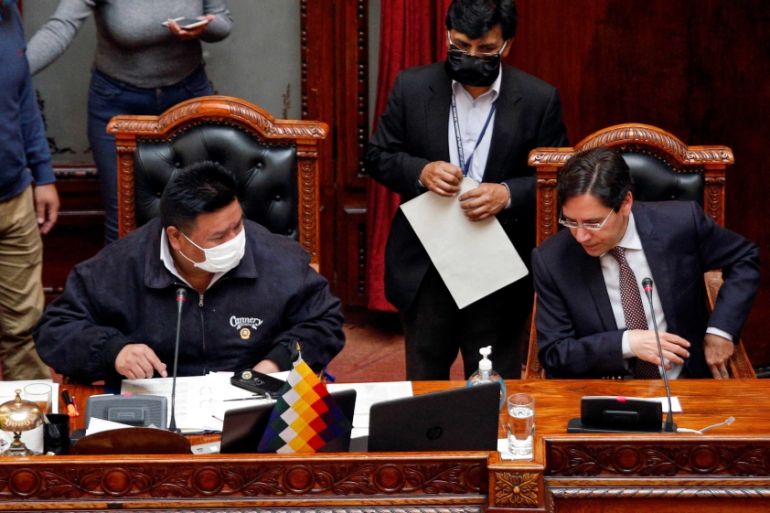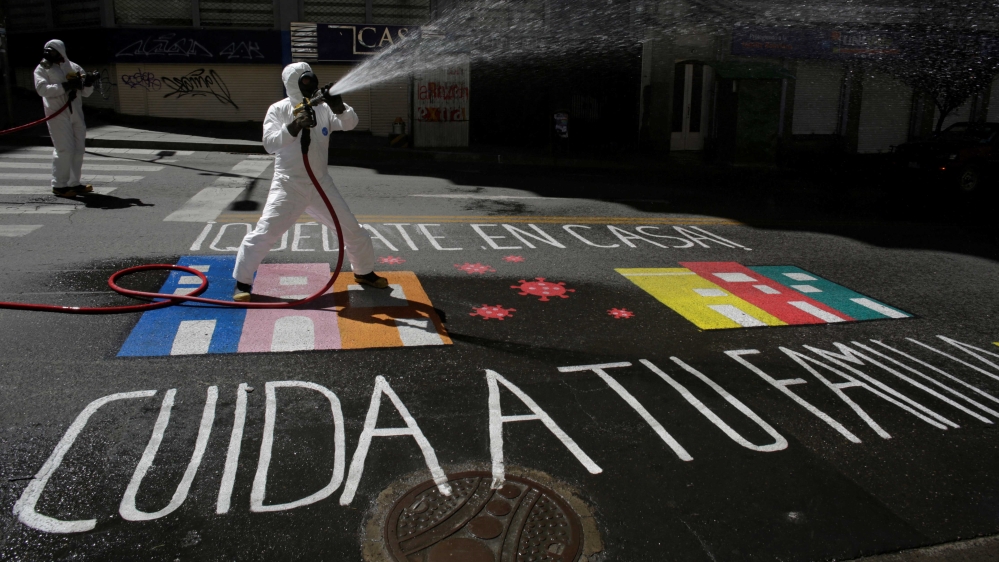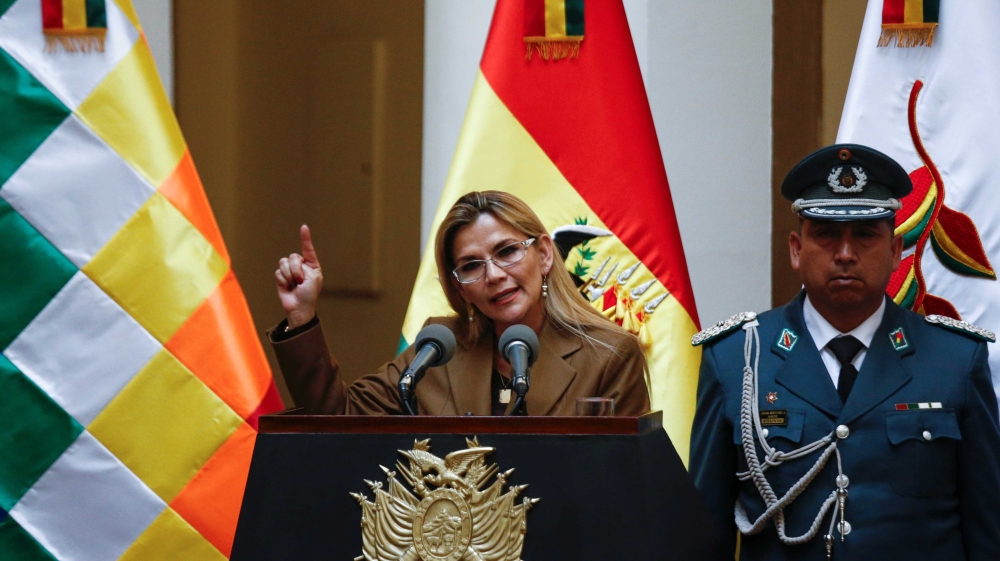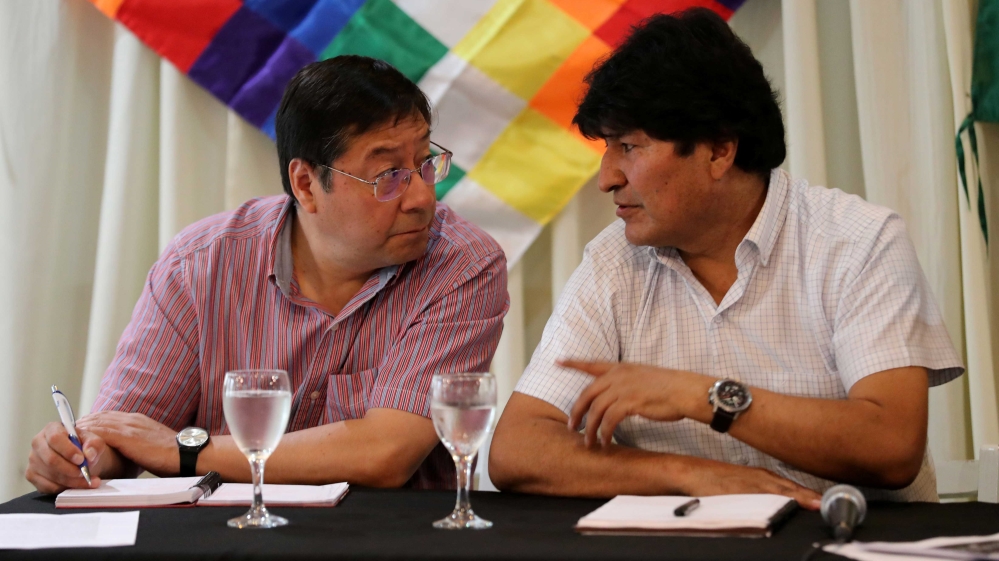Bolivia’s parliament passes law calling for elections in 90 days
Interim President Jeanine Anez condemned move and accused opposition of putting lives of Bolivians at risk.

After weeks of uncertainty, Bolivia’s opposition-controlled parliament approved a law late on Thursday calling for the presidential election to be held within 90 days.
The move was condemned by the country’s interim government, which delayed the May 3 elections after putting the country under strict lockdown measures due to the coronavirus pandemic.
Keep reading
list of 3 itemsBolivia’s Evo Morales resigns: What prompted it and what’s next?
Shortages grip Bolivia as government struggles to contain unrest
For weeks no new date had been set for an election that was meant to be a rerun of the October vote, which gave a narrow fourth-term victory to left-wing leader Evo Morales. The results were fraught with allegations of fraud, sparking violence and protests that led to the resignation of Morales, who fled the country and said he was the victim of an orchestrated coup. The results were later annulled, and Morales was barred from running again.
Thursday’s measure, ushered in by legislative assembly members from Morales’s Movement Towards Socialism (MAS) party, which holds a majority in the congress, mandates that elections must be held before August 2.
Interim President Jeanine Anez, who is a candidate in the upcoming elections, immediately decried the move, accusing MAS presidential candidate Luis Arce of putting the lives of Bolivians at risk in an attempt to regain control of the country.
“In Bolivia, voting is mandatory and forcing almost six million people to move on the street in a single day and in the midst of a pandemic will bring thousands and thousands of infections, and this can generate hundreds of fatalities,” Anez said in a statement.

Raul Penaranda, a journalist and political analyst based in the capital La Paz, said MAS’s latest move is a show of force for the government, and a rejection of its harsh quarantine measures.
“This shows an attempt by MAS to polarise the country and to directly confront the government,” Penaranda told Al Jazeera.
“It also shows that they are rejecting the government’s rhetoric and harsh restrictions on movement,” he said.
The once-bustling streets of the country’s main cities were left deserted, after Anez suspended public transport and imposed stay-at-home orders that allow residents to leave their homes only once a week. The restrictions have severely affected an economy that is largely based on informal work.
Lockdown measures are expected to remain in place until at least May 10. Stay-at-home restrictions in parts of the country little affected by the pandemic will be relaxed starting May 11, Anez announced in a televised address on Wednesday.

Bolivia has 1,167 confirmed COVID-19 cases and 62 deaths from the disease, according to the data compiled by Johns Hopkins University.
Analysts say the delay in elections and the suspension of campaigning events has benefited Anez, a conservative former senator who is hoping to use the crisis in order to showcase her credentials.
On April 15, her government announced it would send each family a cash transfer of $75 for every child enrolled in a public school.
“Anez’s party has been campaigning with state resources,” said Jorge Derpic, assistant professor in sociology, Latin American and Caribbean studies at the University of Georgia.
The opportunity in the limelight, however, could also backfire, analysts say.
“The government is also the one that could get hit the hardest by this crisis if they don’t do things well and people start protesting,” Derpic told Al Jazeera, “they could lose all the support they have amassed so far.”
There are also signs that Anez, whose government has been accused of authoritarianism and excessive use of military force, is using the delay to clamp down on civil liberties, rights groups say. On March 25, she issued a decree that included a provision that criminalises non-compliance with government measures to combat COVID-19 and punishes misinformation.
“The Bolivian government appears to be taking advantage of the pandemic to give itself the power to punish anyone who publishes information the government deems ‘incorrect,’ in violation of free speech protections,” said Jose Miguel Vivanco, Americas director at Human Rights Watch.

There are eight candidates officially registered in the first-round vote, but the presidential contest is expected to largely be a three-way race between Luis Arce, Morales’s former minister of economics, Carlos Mesa, a former president, and Anez.
Despite widespread discontent over Morales’s insistence on running for a fourth term last year, and signs of fracturing within the party, MAS remains the most popular party in Bolivia with a deep, loyal base – and a clear political agenda.
In an opinion poll conducted in March, a third of respondents said they support the MAS, while 18 percent said they would vote for Mesa. Anez’s party came in third with 16.5 percent of the votes.
Filipe Carvalho, an analyst with the Eurasia Group says the coronavirus will provide a “net neutral outcome” for both the MAS and Anez.
“Anez now has the opportunity to show competence in responding to the virus,” Carvalho told Al Jazeera.
“This can be an advantage,” he said. “But at the same time it puts her under scrutiny to demonstrate how she can respond to the crisis.”
For Penaranda, this latest development is likely to play in MAS’s favour, since government lockdowns have disproportionately affected the country’s working-class and poor, the party’s stronghold.
“A popular sector that supports MAS is very affected by the quarantine because they cannot go to work,” Penaranda said. “There is genuine desperation.”